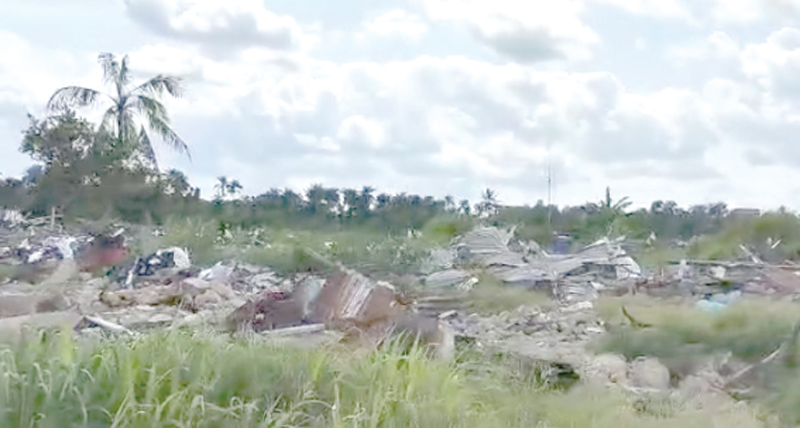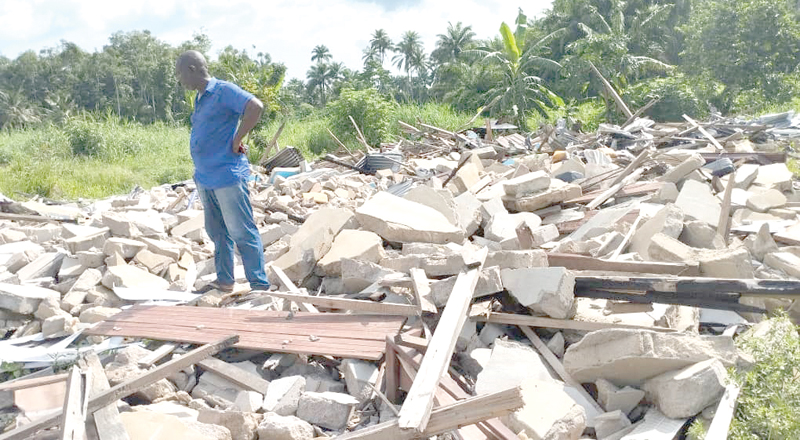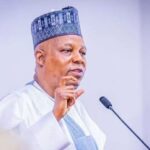EBENEZER ADUROKIYA describes the state of Okuama community in Ughelli South Local Government Area of Delta State after the military, who occupied the community following the killing of 17 officers and soldiers, pulled out.
For almost two months, the riverine community of Okuama-Ewu (occupied by Urhobo people) in Ughelli South Local Government Area of Delta State was under firm military occupation. The mission of the military was to avenge the brutal assassination of 17 officers and soldiers of the Nigerian Army that were said to be on a peace-keeping mission to Okuama. Before the mission, Okuama has been embroiled in a fearsome land dispute with Okoloba community, an Ijaw enclave despite intermarriages between both communities.
By the time the soldiers were signalled to pull out of Okuama on May 7, 2024, the community had been ravished. The indigenes hiding in the woods and other settlements had been broken. They were socially and psychologically traumatised by the time they summoned courage to return.
Okuama after soldiers’ exit
Shortly after the soldiers pulled out of the land albeit unannounced, Nigerian Tribune gathered that some criminally-minded individuals allegedly from neighbouring communities of Okoloba and Akugbene in Bomadi Local Government Area went to loot what was left of Okuama. Items of interest to the looters were iron rods from the rubble of residential houses, electrical cables, solar panels, handy household items among others.
They were also said to have begun to harvest crops such as cassava, pepper, and potatoes among others.
It was no surprise that after the news filtered out that the soldiers had withdrawn, clashes erupted as Okuama youths and women, who returned from their hiding places, met the looters at work and engaged them in a fierce battle. This clash reportedly left one person killed and others wounded.
Speaking on the attack, a former chairman of Akugbene, a neighbouring Ijaw community, who pleaded anonymity, denied that any looting took place.
He explained that: “We were surprised to see the soldiers pulled out on Tuesday (May 7) and some indigenes of Okuama immediately went back to the community.”
He claimed that Okuama people had gotten wind of the pullout ahead of time.
“We have some respite now. But we could not move out to the neighbouring communities, in the direction of Okuama, where we go and buy most of our foodstuffs and household materials, particularly at the Okuagbe market.
“But, as I’m talking to you, there is a problem. Three indigenes of our community have already been ambushed and attacked with machetes by Okuama returnees.
“They were on their way to Ezebiri community along the footpath linking various communities on hearing that the road was free.
“One of them, who escaped back to our community with machete cuts, narrated that they were attacked by the Okuama returnees while on their way to Ezebiri.
“They attacked them with machetes but he managed to escape, while others were led towards the jetty at the community waterfront.
“The victim is in a critical condition with us right here at the primary healthcare centre,” he claimed.
However, an indigene of another neighbouring community, who also declined being identified, said: “Those youths went to Okuama to loot upon hearing that soldiers had left the community.
“Armed youths of Okuama accosted and shot at them and some are said to have been cut with machetes.”
After the tragedy that befell the 17 soldiers, journalists, Governor Sheriff Oborevwori, as well as the Delta State Police Command were barred from the community. It was declared a war zone by the military.
An attempt by the governor to visit at one time, saw Governor Oborevwori end his trip at Bomadi where an army formation is situated.
Current state of Okuama
Okuama is a riverine community sandwiched between Okoloba and Akugbene – both Ijaw communities.
During a visit to Okuama by some journalists last week, the atmosphere on approaching the ruined community was that of pain and anguish. Seven churches, a community town hall, school buildings, a health centre and all residential buildings had been levelled. It was gathered that corpses were being discovered in and around the community.
The famished returnees were seen taking shelter in the only standing building, Anglican church, where they battle with mosquitoes and dangerous reptiles at night.
Rubbles of the once cozy residential buildings littered the land. Cash crops, except for one or two coconut trees, were not spared. No domestic animal could be sighted.
Panels and poles of solar street lights were felled and vandalised. An electricity transformer serving the community had been carted away.
A few electricity poles with high-tension cables were seen still standing.
In some cases, shrubs had taken over the streets and levelled buildings. The military occupation left nothing alive in Okuama.
Meanwhile, as some Okuama folks returned to their ruined ancestral home to pick up the pieces of their lives, the Delta State government has set up an internally displaced persons (IDP) camp at Ewu in Ughelli South Local Government Area.
But this arrangement has not gone down well with the returnees who are insisting that the camp should be sited in Okuama rather than in another community. As a result, the IDP camp is reportedly empty.

Returnees narrate ordeals at Okuama
One of the distraught youths, Ogheneohuko Okota, who spoke to Nigerian Tribune bemoaned the situation at Okuama, but insisted that going elsewhere, albeit temporarily, was impossible for them as they are glued to their ancestral home.
Standing on top of the rubble of his house, he said: “We can’t survive easily elsewhere. We prefer to stay in our own ancestral land rather than going to the IDP camp at Ewu. The government should relocate the IDP camp to Okuama so that we can feel at home.
“We want to plead with the government to set up the IDP camp here in Okuama. We›d be more comfortable here in Okuama than going to Ewu.”
Speaking on the living condition of the returnees, he said, “We have a river here which we drink, cook and bathe from. We live in the only church that was not destroyed by the military.
“To sleep, we’re managing some mosquito nets that the soldiers left behind after withdrawing from Okuama.
“For those of us that have returned, we cook collectively. When we returned, we met some fishing nets that were not destroyed. So, most times we go fishing which we use for cooking.
“The government should not see our refusal to go to Ewu IDP camp as disobedience. We have enough land here. If the government wants to rebuild the community, we can stay on one side of the land while they build on the other side of the expanse of land.”
Another returnee, Madam Yellow Degbe, who had returned to farming was with her farm implements inside the Anglican church when she spoke.
“It’s God that helped us, if not all of us would have been dead today. They’ve destroyed all our houses including mine. There is no place to stay on our return.
“We’ve been living in the bush. We’ve been suffering. No shelter, no food, no money, nothing. All we had before has been destroyed.
“The attire on me is the only cloth I have left. I don›t possess anything anyone can boast of having in life. I’m left with nothing!
“We’re not going to Ewu IDP camp where they claim to have provided us with everything. If they want to camp us, they should come to Okuama to build the camp and not in another place. None of us will go to the Ewu IDP camp. If they build the camp here, all our exiled indigenes will return home.
“I have crops especially cassava that I want to harvest very soon. How will I be coming from Ewu to work at Okuama? If the governor really wants to help us, he should come and build the camp here as well as rebuild our houses. Okuama people will not go to Ewu. But even if they want to go, I won’t go. I have nothing to take from Ewu. But here, I have something,” she disclosed.
Chairman of Okuama indigenes in Warri, Mr Emmanuel Okrika, who spoke to Nigerian Tribune while inspecting the rubble of his house, lamented the wanton destruction of his property and that of others whose mainstay was subsistent farming.
“I’m standing on the rubble of my own house. The house I spent 35 years of my life to build. All my sweat as a civil servant has been turned to rubble.
“I had a little guest house in my compound too. They are all gone. This is terrible. I don’t know what to do. It’s too much for me to bear.”
He explained how difficult it was to build his house. “You know what it means to build a house in the creeks? I collected all the cooperatives loans available to build it. Everything in my buildings – electronics, name them – are all gone! They’ve destroyed what I retired to for survival.”
“We’re dying; we’re ruined! They should come and help us,” he agonised amid intermittent sobs as he stared at the ruins of his property.

Accusations, counter accusations
Women from the neighbouring communities of Okoloba and Akugbene staged separate protests to express their grievances a few days after the exit of soldiers from Okuama.
Recall that some alleged looters were found in Okuama by returnees leading to a clash shortly after the soldiers pulled out.
Ever since, there have been accusations and counter-accusations between Okuama and Okoloba communities. While one is raising allegations of looting, the other has been raising allegations bordering on arson and other crimes.
Distraught women of Okuama protested in the community last Monday, accusing Okoloba women of harvesting cassava, potatoes, and pepper from their farms.
They, during the protest, also accused Okoloba youths of laying siege on the waterways with arms, awaiting their return, as well as spying on them. They called on President Bola Tinubu and Governor Oborevowri to wade in.
According to one of the protesters, “They stole our foams, boats, and other property and sold them before we returned on May 8. We caught them digging up our cassava, and they ran away.
“On Sunday, armed youths of Okoloba blocked us with guns on the waterways. We had to take another route to come to Okuama.
“Our community is an island. We come in through Okwagbe on the waterways, and you will first get to Okoloba before Okuama, and they blocked us with guns on that day.”
Another woman protester alleged: “When we got to our farms this morning, we found that Okoloba and Akugbene women were harvesting our cassava. When we earlier cried out that, they were stealing our cassava, people thought we were raising a false alarm, you can see it now.”
Preceding the Okuama women’s protest was a protest by the women of Okolaba, led by the chairlady of the community, Mrs Timipakebi Godwin, and secretary, Mrs Mary Koibi.
Some of the placards read: “We say ‘No to violence, enough of the killings on our land,” “We say ‘No’ to the return of armed youths of Okuama,” and “We mourn the killing of the 17 soldiers,” among others.
Mrs Godwin read to journalists a written address which she claimed had already been made available to security agencies and the local government authorities.
She said, “First, we the women of Okoloba community sympathise with the killing of 17 soldiers and officers of the Nigerian army on peace and rescue mission to Okuama, following the kidnap of our son.
“We sincerely mourn their untimely deaths and pray for the repose of their souls. We also pray for their families.
“However, less than 24 hours after the exit of the troops from Okuama, a fresh crisis erupted with another neighbouring community, culminating in the killing of one person while three other persons were seriously injured.
“The person, who was killed and those who sustained machete wounds, were alleged to have gone there to loot.
“We are calling on the Federal Government to come to our aid, and the panacea to these incessant clashes and killings is for the government to relocate Okuama to Ewu clan in Ughelli South Local Government Area, where they truly and rightly belong.”
Meanwhile, president-general of Okuama community, Mr James Akata, who was reached via his mobile phone by Nigerian Tribune, refuted the claim that Okuama youths had returned to the land with arms to destroy.
“Before the coming of one Ijaw man to Okuama, we’ve been living at peace with Okoloba people; we even intermarried.
“Shortly after the soldiers pulled out of Okuama last week, Okoloba boys invaded the ruins and began to loot iron rods and what have you from the ruins of people’s sweat. Isn’t it salt upon injury? Looting from a destroyed community? No empathy for the people’s plight?
“On returning, Okuama youths met Okoloba boys looting their ruins. For people who met all their life struggles in ruins, it’s just natural for them to vent their anger on the looters.
“We have suffered enough destruction already. All our buildings and property in them were destroyed. Some of us are still on exile because there’s nothing left to return to.
“In fact, is it not even dangerous for us to return home without the government providing any form of security for the returnees?
“Okuama indigenes are peaceful people. We’re brothers to our neighbours. Planning to deroot us completely from our ancestral lands should not be allowed to materialise,” he pleaded.
While tension appears to be building up between the two Ijaw communities of Okoloba and Akugbene against Okuama-Ewu of Urhobo stock, which is in ruins, a recent official letter dated May 6 and signed by two leaders of Okuama community – Emmanuel Okrika and Victor Akemor, which was addressed to the Senator representing Delta South Senatorial District, Chief Ede Dafinone, disclosed that on January 27, 2024, three indigenes of the community were killed over the land dispute between Okuama and Okoloba.
Between March 14 and 15 when the 17 personnel were murdered and soldiers attacked Okuama, the Okuama leaders further stated that 101 men, women, and children of the community lost their lives. They said out of the 101 murdered souls, 15 died in the forest where they fled when soldiers invaded Okuama.
Legal battle
Meanwhile, indigenes and sympathisers of Okuama community have hired a team of lawyers to plead their case against the Federal Government and the Nigerian Army at the Federal High Court sitting in Warri. On May 2, the court, after the mentioning of the case before the presiding judge, Justice Sani, adjourned till June 4, 2024 for hearing.
The suits included the following: FHC/WR/CS/41/2024 and FHC/WR/CS/42/2024 and another filed by a non-governmental organisation. Suit FHC/WR/CS/41/2024 had Victor Akemor and 16 others as Applicants with the Nigerian Army as the respondent.
Suit FHC/WR/CS/42/2024 had Professor Arthur Ekpekpo, Mr Bernard Esegba and Mr James Oghohoko as applicants, with the Federal Government, the Chief of Defence Staff and others as respondents.
In Suit FHC/WR/CS/41/2024, the applicants, through their lawyer, Chief Malcolm Omirhobo in their application, sought the order of the court for 15 prayers which include “an award of one billion naira against the respondent as “exemplary damage” in favour of the Okuama community.
Amid the accusations and counter accusations between Okoloba and Okuama communities, the government of Sheriff Oborevwori, in the wake of the withdrawal of troops from Okuama on May 8, has promised to facilitate the process of returning Okuama people to their ancestral land.
ALSO READ: Drama as Binance executive, Gambaryan, collapses in court over alleged ill-health






